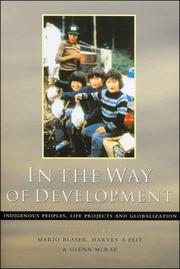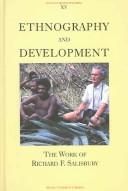| Listing 1 - 7 of 7 |
Sort by
|
Article
Abstract | Keywords | Export | Availability | Bookmark
 Loading...
Loading...Choose an application
- Reference Manager
- EndNote
- RefWorks (Direct export to RefWorks)

ISBN: 1842771922 1842771930 1552500047 9781552500040 9781842771921 1848137044 1280717254 9786610717255 1848131038 1350220728 9781350220720 9781848137042 9781280717253 9781842771938 6610717257 9781848131033 Year: 2004 Publisher: London, England : [London, England] : Zed Books, Bloomsbury Publishing,
Abstract | Keywords | Export | Availability | Bookmark
 Loading...
Loading...Choose an application
- Reference Manager
- EndNote
- RefWorks (Direct export to RefWorks)
Indigenous peoples today are enmeshed in the expanding modern economy, subject to the pressures of both market and government. This book takes indigenous peoples as actors, not victims, as its starting point in analysing this interaction. It assembles a rich diversity of statements, case studies and wider thematic explorations, primarily from North America, and particularly the Cree, the Haudenausaunee (Iroquois) and Chippewa-Ojibwe peoples who straddle the US/Canadian border, but also from South America and the former Soviet Union. It explores the complex relationships between indigenous peop.
Development aid. Development cooperation --- Indigenous peoples. --- Economic development. --- Human rights. --- Postcolonialism. --- Autochtones --- Développement économique --- Droits de l'homme (Droit international) --- Postcolonialisme --- Post-colonialism --- Postcolonial theory --- Political science --- Decolonization --- Basic rights --- Civil rights (International law) --- Human rights --- Rights, Human --- Rights of man --- Human security --- Transitional justice --- Truth commissions --- Development, Economic --- Economic growth --- Growth, Economic --- Economic policy --- Economics --- Statics and dynamics (Social sciences) --- Development economics --- Resource curse --- Aboriginal peoples --- Aborigines --- Adivasis --- Indigenous populations --- Native peoples --- Native races --- Ethnology --- Law and legislation --- Development studies --- Indigenous peoples --- inheemse kennis --- indigenous knowledge --- ontwikkeling --- development --- ontwikkelingstheorie --- development theory --- idrc --- inheemse volkeren --- indigenous people --- Sociology (General) --- Cultural Anthropology (General) --- Conditions of Existence --- Sociologie (algemeen) --- Culturele antropologie (algemeen) --- Bestaansvoorwaarden

ISBN: 1842771922 1842771930 1552500047 Year: 2004 Publisher: London Zed Books
Abstract | Keywords | Export | Availability | Bookmark
 Loading...
Loading...Choose an application
- Reference Manager
- EndNote
- RefWorks (Direct export to RefWorks)
Book
Year: 1992 Publisher: Montréal, Québec : McGill programe in the anthropology of development,
Abstract | Keywords | Export | Availability | Bookmark
 Loading...
Loading...Choose an application
- Reference Manager
- EndNote
- RefWorks (Direct export to RefWorks)
Cree (indiens) --- Securite du revenu --- Cree (indiens) --- Securite du revenu

ISBN: 1283531402 9786613843852 077358465X 9780773584655 0771706227 9780771706226 0773529500 9780773529502 9781283531405 6613843857 Year: 2004 Publisher: Montréal McGill University Libraries
Abstract | Keywords | Export | Availability | Bookmark
 Loading...
Loading...Choose an application
- Reference Manager
- EndNote
- RefWorks (Direct export to RefWorks)
Richard Salisbury (1926-1989) was a pioneer in development anthropology and one of the founders of McGill University's anthropology department. His work had immense influence in the areas of economic anthropology, ethnographic practice (New Guinea, northern Canada) and policy formation. This volume commemorates and explores his life and work. Ethnography and Development presents eighteen articles written by Salisbury between 1954 and 1988, framed by seven original essays that explore his basic ideas as well as the intellectual and personal contexts in which he worked. The articles and essays highlight many of the issues that informed those of his generation who worked in economic and political anthropology, the anthropology of development, public anthropology, advocacy and applied anthropology, and in developing the organisational vehicles on which the profession currently depends. Salisbury's broad socio-economic vision, conceptual ideas, and socio-cultural ethnographic theories continue to exert a powerful influence on the discipline. Contributors include Harvey A. Feit (McMaster University), Henry J. Rutz (Hamilton College), and Colin H. Scott (McGill University).
Applied anthropology. --- Rural development. --- Technical assistance --- Economic development. --- Anthropological aspects.
Book
Year: 2004 Publisher: Ottawa ; Cairo ; Montevideo in association with the International Development Research Centre
Abstract | Keywords | Export | Availability | Bookmark
 Loading...
Loading...Choose an application
- Reference Manager
- EndNote
- RefWorks (Direct export to RefWorks)
Indigenous peoples --- Economic development --- Human rights --- Postcolonialism
Digital

ISBN: 9781487513764 Year: 2021 Publisher: Toronto, Ont. University of Toronto Press
Abstract | Keywords | Export | Availability | Bookmark
 Loading...
Loading...Choose an application
- Reference Manager
- EndNote
- RefWorks (Direct export to RefWorks)
| Listing 1 - 7 of 7 |
Sort by
|

 Search
Search Feedback
Feedback About UniCat
About UniCat  Help
Help News
News